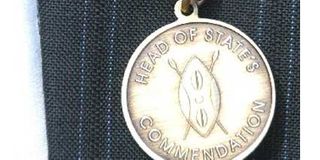A market mechanism could improve Kenya’s national awards and honours

What you need to know:
- Some recipients of national awards are among Kenyans charged with corruption and other serious crimes. This shows that the screening mechanism is not working well enough.
- Every citizen should pursue excellence, support causes of their choice and pay taxes promptly, with government providing no encumbrance or advantage to one over another.
Many countries, like Kenya, present awards at the discretion of the Executive or other arms of government to individuals considered to have made outstanding achievements in the service of their nation, or for causes that elevate the good in society.
For independent Kenya, these national awards and recognition of distinguished service, whether in the private or public sector, is retained from colonial practice.
That practice meant that identification of those deemed deserving was at the discretion of officers in the Executive. Because of this discretion, they reflect the objectivity or bias of those bearing that responsibility.
Among the odd results of the absence of transparency around these decisions is that some recipients of national awards are among Kenyans charged with corruption and other serious crimes.
PUBLIC SCRUTINY
This shows that the screening mechanism is not working well enough.
The National Honours Act and the recent amendment to it provides a structure for the president to confer honours and titles as anticipated by article 132 (4) of Kenya’s Constitution.
In the statute are attempts to formalize the process for identification, screening of both individuals and institutions prior to recommendation for award.
Of significance is that the law requires publication of candidates for public scrutiny and comment before an award, a register of national honours and methods for suspension and revocation of the awards.
MIXED RECORD
This Act of Parliament scores highly for opening this public process to transparent observation, scrutiny and the possibility that the register of recipients would be in a single database. In spite of its clarity, and in addition to whether it solves the issue of bias in the nomination of recipients, it remains unclear whether this law is necessary to begin.
The mixed record of the recipients of national awards in Kenya should lead us to question whether citizens or associations should be awarded for seeking excellence in their work and contributing to the growth and development of their society.
Given the discretion that the advisory committees have in determining the nominees, the profile of a professional who receives a nomination is unlikely to change. Political connections and cronyism is to be expected to continue to influence the process, with a low chance that nominations generated by individuals outside the three arms of government will pass scrutiny.
OBSCURE BY CHOICE OR ACCIDENT
With the exception of sportsmen and the odd professional supporting popular causes, recipients tend to have a discernible connection to government through political, business or social ties. This state of affairs is sub-optimal because distinguished professionals are rewarded with a title or medal for being a good citizen.
The breadth of work that Kenyans engage in throughout the republic and outside its borders means that the advisory committees are unlikely to find professionals or associations that are obscure by choice or accident.
Thus the model perpetuates the identification of the most conspicuous people and replicates the biases borne by public servants.
While the law permits individuals outside the advisory committees to nominate other persons or associations considered deserving of the honours, it is not clear that the deliberations by the three committees and their reasons for rejecting one person and approving another will be available for scrutiny.
EVERYONE SHOULD PURSUE EXCELLENCE
From the perspective of a taxpayer, and without prejudice to the constitutional endorsement of national honours, I remain sceptical of the idea that government should provide rewards to individuals for excellent performance in their work.
The reason is that it is expected that every citizen should pursue excellence, support causes of their choice and pay taxes promptly, with government providing no encumbrance or advantage to one over another.
Awarding of honours by the government involves no monetary compensation, though the value of medal or insignia does have a cost for the public.
A new idea for testing the value of national awards would be to separate the national honours based on pre-selection by the advisory committee from a separate set that would be auctioned off at regular intervals.
TRUE VALUE
The latter would be a good indicator of the true value that Kenyans place on the honours system. Each of the medals would find its value on the basis of their scarcity and how much eligible Kenyans would be willing to accept self-taxation to wear the honours.
And this would create a set of truly admirable Kenyans willing to buy a valuable and scarce asset in the hands of government and thereby separate themselves from those receiving them based on social political and business ties to decision makers.
There’s a market out there for national honours. Let’s try it.
Kwame Owino is the chief executive officer of the Institute of Economic Affairs (IEA-Kenya), a public policy think tank based in Nairobi. Twitter: @IEAKwame





